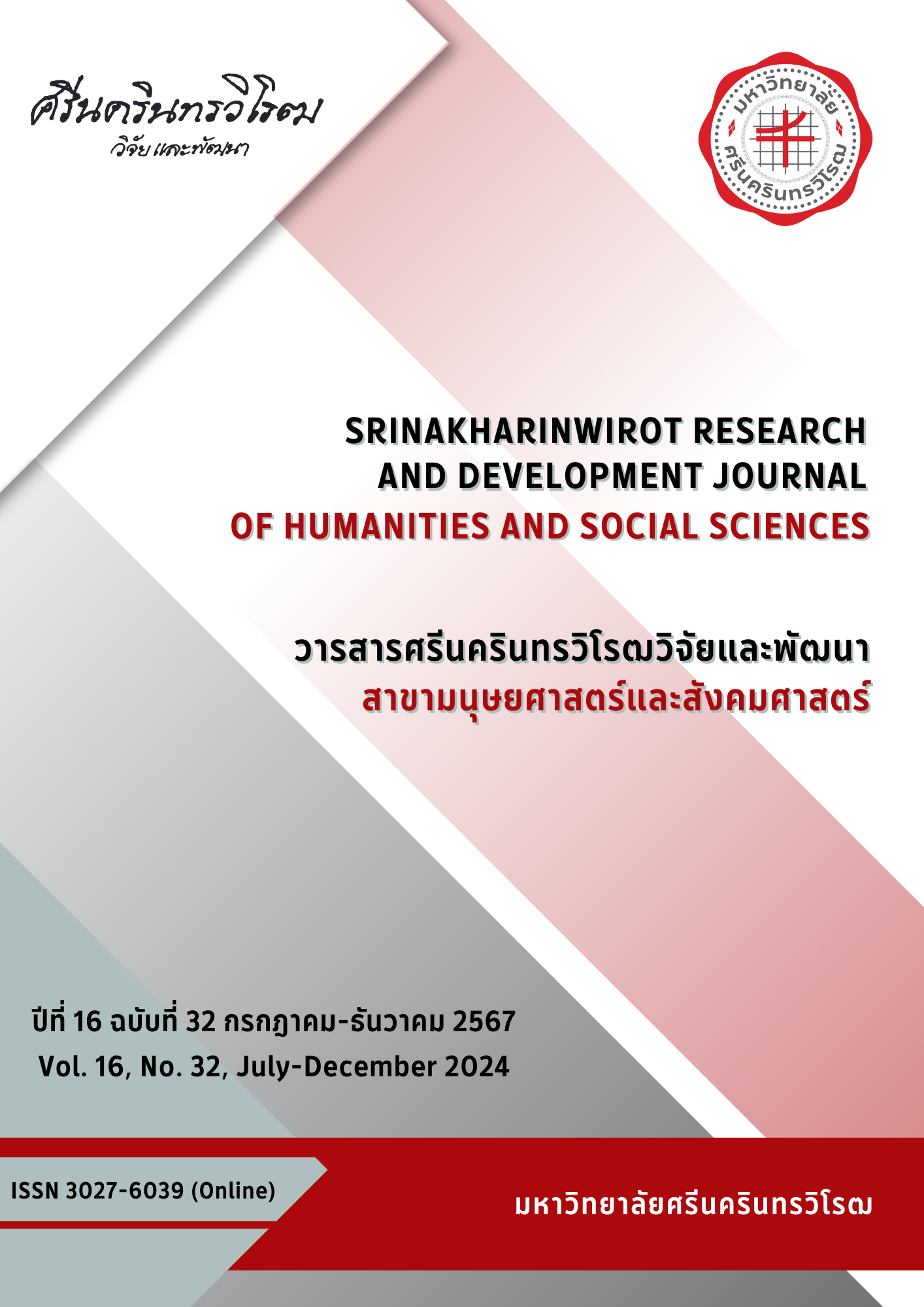THE DEVELOPMENT OF POLICY PROPOSALS FOR DRIVING THE COMMUNITY-BASED TOURISM INDUSTRY TO ENHANCE THE QUALITY OF LIFE AND THE CREATIVE GRASSROOTS ECONOMY OF RACHABURI PROVINCE
Keywords:
Policy Proposal, Community-Base Tourism, Grassroots Economy, RatchaburiAbstract
The province of Ratchaburi is close to Bangkok and has a variety of cultures, historical sites, and natural features. As a result, it has the potential to become a popular tourist destination. The goal of this study was to use qualitative methodologies to provide a policy plan for encouraging the community-based tourism sector to improve the quality of life and the creative economy in Ratchaburi Province. In-depth interviews, professional seminars, and policy meetings make up the three stages of data collecting. The 114 key informants include government organizations in charge of tourism, hotels and resorts, restaurants, community enterprises in the province of Ratchaburi, as well as senior and family tourists. A triangular method of data collection was employed to obtain the data while applying the Case Study and the Phenomenological approach. The research's findings policy proposal fall into five categories: 1) Elements of the growth of the tourism industry's quality. 2) Developmental aspects of tourist attractions. 3) Culturally distinct tourist development dimensions. 4) Community-based tourism networks 5) Marketing dimensions for tourism promotion.
Downloads
References
สำนักเลขาธิการนายกรัฐมนตรี. (2563). สรุปข่าวการประชุม ครม. 30 พฤศจิกายน 2563. สืบค้นเมื่อ 4 มิถุนายน 2564, จาก https://www.thaigov.go.th/news/contents/details/48878
สำนักวิจัยและพัฒนาการจัดการที่ดิน. (2564). เมืองเกษตรสีเขียว ราชบุรี. สืบค้นเมื่อ 20 มิถุนายน 2564, จาก https://www.ldd.go.th/WEB_Greencity/PDF/6GAC_Ratburee.pdf
กองส่งเสริมวิสาหกิจชุมชน. (2564). ระบบสารสนเทศวิสาหกิจชุมชน. สืบค้นเมื่อ 2 มิถุนายน 2564, จาก https://smce.doae.go.th/ProductCategory/SmceCategory.php?region_id=andprovince_id=70andamphur_id=andkey_word=
สำนักงานกองทุนสนับสนุนการสร้างเสริมสุขภาพ (สสส.). (2561). ปี 63 ราชบุรีเข้าสู่สังคมสูงวัยสมบูรณ์แบบ. สืบค้นเมื่อ 2 พฤษภาคม 2564, จาก https://www.thaihealth.or.th/ปี-63-ราชบุรีเข้าสู่สังคม/
สำนักงานเกษตรและสหกรณ์ จังหวัดราชบุรี. (2563). แผนพัฒนาจังหวัดราชบุรี พ.ศ. 2561-2565 ฉบับทบทวน ปี พ.ศ. 2563. สืบค้นเมื่อ 3 พฤษภาคม 2564 จาก https://www.opsmoac.go.th/ratchaburi-strategic-files-421991791799
Dangi, T. B., and Jamal, T. (2016). An integrated approach to “sustainable community-based tourism”. Sustainability, 8(5), 475.
จังหวัดราชบุรี. (2564). แผนพัฒนาจังหวัดราชบุรี พ.ศ. 2561-2564 (ฉบับทบทวนปี พ.ศ. 2562). สืบค้นเมื่อ 17 มิถุนายน 2566, จาก https://ratchaburi.industry.go.th/web-upload/migrated/files/2016_microsite_ratchaburi/319_cms_file_11615_article_file.pdf
Macefield, R. (2009). How to specify the participant group size for usability studies: a practitioner's guide. Journal of Usability Studies, 5(1), 34-45.
Patton, M. Q. (1990). Qualitative evaluation and research methods (2nded.). Beverly Hills, CA: Sage.
Bhandari, N. A., MacDonald, B. L., Martin, J. M., Biviano, A. M., Simmons, J. M., Turner, W. D., and Asselin, S. (2013). Professional seminar: Valuing a one-credit course through the lens of doctoral students. International Journal of Teaching and Learning in Higher Education, 25(3), 346-357.
Nastasi, B. K., and Schensul, S. L. (2005). Contributions of qualitative research to the validity of intervention research. Journal of School Psychology, 43(3), 177-195.
นรินทร์ สังข์รักษา. (2551). รายงานการวิจัยเรื่อง ผลดีของการประยุกต์ใช้หลักปรัชญาเศรษฐกิจพอเพียงในกระบวนการเรียนรู้และการจัดการความรู้เพื่อการพัฒนาที่ยั่งยืนของวิสาหกิจชุมชน: กรณีศึกษาจังหวัดราชบุรี. สำนักงานคณะกรรมการการวิจัยแห่งชาติ.
Pedrosa, A., Martins, F., and Breda, Z. (2022). Tourism routes: A scoping review. European Journal of Tourism Research, 32, 3216-3216.
สัจจา ไกรศรรัตน์. (2555). การศึกษาเพื่อพัฒนาบุคลิกภาพจังหวัดราชบุรี ในฐานะของแหล่งท่องเที่ยว. วารสารวิชาการการท่องเที่ยวไทยนานาชาติ, 8(1), 57-80.
Kapiki, S. (2012). Quality management in tourism and hospitality: An exploratory study among tourism stakeholders. International Journal of Economic Practices and Theories, 2(2), 53-61.
Kim, Y. Z., and Lee, K. (2008). Sectoral innovation system and a technological catch-up: the case of the capital goods industry in Korea. Global economic review, 37(2), 135-155.
Artal-Tur, A., Briones-Peñalver, A. J., Bernal-Conesa, J. A., and Martínez-Salgado, O. (2019). Rural community tourism and sustainable advantages in Nicaragua. International Journal of Contemporary Hospitality Management, 31(6), 2232-2252.
Bond, N., and Falk, J. (2013). Tourism and identity‐related motivations: Why am I here (and not there)?. International Journal of Tourism Research, 15(5), 430-442.
อาจารี รุ่งเจริญ, และศุภกรณ์ ดิษฐพันธุ์. (2557). การใช้เอกลักษณ์จากศิลปะการแสดงพื้นบ้านเพื่อการส่งเสริมการท่องเที่ยวทางวัฒนธรรม : กรณีศึกษาจังหวัดสุพรรณบุรี. วารสารสถาบันวัฒนธรรมและศิลปะ มหาวิทยาลัยศรีนครินทรวิโรฒ, 16(1), 47-56.
Xue, L., Kerstetter, D., and Hunt, C. (2017). Tourism development and changing rural identity in China. Annals of Tourism Research, 66, 170-182.
Aref, F. (2011). Sense of community and participation for tourism development. Life Science Journal, 8(1), 20-25.
Giampiccoli, A., and Saayman, M. (2018). Community-based tourism development model and community participation. African Journal of Hospitality, Tourism and Leisure, 7(4), 1-27.
Tsiotsou, R., and Ratten, V. (2010). Future research directions in tourism marketing. Marketing intelligence and planning, 28(4), 533-544.
Dodds, R., Ali, A., and Galaski, K. (2018). Mobilizing knowledge: Determining key elements for success and pitfalls in developing community-based tourism. Current Issues in Tourism, 21(13), 1547-1568.
นิสา บุญทะสอน, สุดารัตน์ มานะ, และบังอร พลเตชา. (2557). การพัฒนาการตลาดและการท่องเที่ยวของธุรกิจชุมชนสู่วิสาหกิจชุมชนเพื่อส่งเสริมการท่องเที่ยวอย่างยั่งยืนในอำเภอหันคา จังหวัดชัยนาท. จันทรเกษมสาร, 20(39), 39-48.
Downloads
Published
How to Cite
Issue
Section
License
Copyright (c) 2024 Srinakharinwirot Research and Development Journal of Humanities and Social Sciences

This work is licensed under a Creative Commons Attribution-NonCommercial-NoDerivatives 4.0 International License.
Srinakharinwirot Research and Development Journal of Humanities and Social Sciences is licensed Under a Creative Commons Attribution-NonCommercial-NoDerivs 4.0 International (CC-BY-NC-ND 4.0) License, Unless Otherwise Stated. Please Read Journal Policies Page for More Information on Open Access, Copyright and Permissions.



